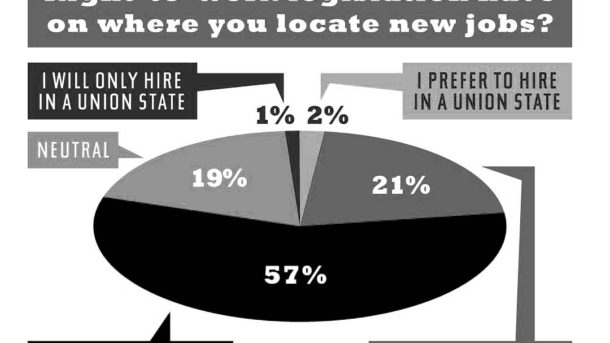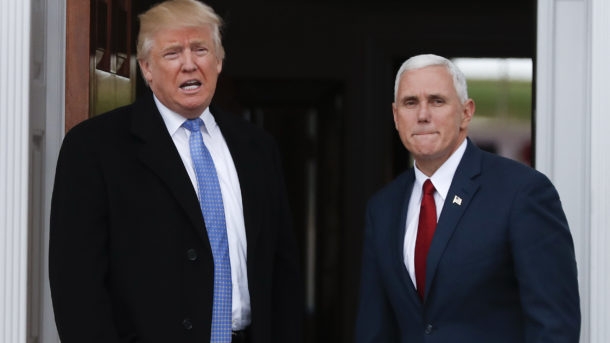Is This Any Way to Run a City’s Schools?
Leaked CTU Proposals Won’t Do Anything to Improve Schools’ Poor Performance

Grass-Roots Activism Will Sway More and More Lawmakers to Sign On
Early this year, the National Right to Work Act, legislation that would eliminate all the current provisions in federal labor law that authorize forced union dues and fees as a job condition, was brought before the U.S. House and Senate.
Since then, the Right to Work Act, respectively introduced in Congress’ lower chamber as H.R.785 by Reps. Steve King (R-Iowa) and Joe Wilson (R-S.C.) and in its upper chamber as S.545 by Sen. Rand Paul, has steadily gained Capitol Hill support.
As of the end of May, H.R.785 and S.545 had a total of 67 House and Senate sponsors.
Meetings With Committee Legislative Personnel Have Evidently Had an Impact
Many of these sponsors signed on to forced-dues repeal shortly after they and/or their staff had met personally with National Right to Work Committee legislative representatives.
But other members of Congress are likely to cosponsor H.R.785/S.545 only after receiving extra encouragement from their constituents.
And that’s an area where the 2.8 million rank-and-file members of the Committee play a critical role.
“There are a number of excellent reasons why every member of Congress who isn’t already in Big Labor’s pocket should be eager to put his or her support behind H.R.785/S.545 and push for roll-call floor votes on this legislation,” said Committee President Mark Mix.
“But for some House members and senators the case for a national Right to Work law seems to be more convincing when it is presented by a freedom-loving constituent, rather than by a professional Right to Work staff member.
“That’s why the Committee, through its publications, strives to help rank-and-file members and supporters be prepared to speak comfortably about the Right to Work issue with their elected officials and with candidates seeking to represent them.”
One very significant point in favor of Right to Work legislation, albeit not the most important one, is it fosters the creation and retention of high-paying, family-supporting jobs.
Business Leaders Lopsidedly Prefer to Hire or Only Hire In Right to Work States
As regular readers of the National Right to Work Newsletter know, there is a mountain of evidence indicating that legislation barring compulsory union financial support as a job condition is economically beneficial.
One especially powerful example is the survey of CEOs from around the country that Chief Executive magazine annually conducts.
The survey asks business leaders to grade all 50 states in three general categories that businesses invariably consider when they are contemplating where to make job-creating investments.
In early 2017, CEOs were once again asked to draw upon their direct experience to rate each state for a) taxation and regulations, b) workforce quality, and c) living environment.
In its May/June issue, Chief Executive published its survey results for this year, based on responses received from more than 500 American CEOs.
They show a remarkable 78% of CEOs either “only hire” or “prefer to hire” in Right to Work states. Just 3% of CEOs expressed a preference for forced-unionism states! (See the chart on page one for more information.)
Overwhelmingly through the years, job creators have judged that, in Right to Work states, employees have superior work ethics, real estate costs are relatively low, and public officials have a much more positive attitude toward business.

Conscientious, Talented Employees Usually Hurt by Union Monopoly Bargaining
And every one of the 10 states rated as the “best for business” overall this year is a Right to Work state.
In contrast, forced-unionism states dominated the bottom ranks of the 2017 survey. Not one of the bottom 13 states has a Right to Work law on the books.
“Compulsory unionism is wrong, plain and simple,” Mr. Mix affirmed.
“The fact is, conscientious and talented employees are often economically harmed when they are forced, by government policy, to accept an unwanted union as their ‘exclusive’ bargaining agent on matters concerning their pay, benefits, and working conditions.
“Harvard economist Richard Freeman, arguably the leading academic apologist for monopolistic unionism in the U.S., has actually paid tribute to union bosses’ remarkable success in ‘removing performance judgments as a factor in determining individual employees’ pay.’
“And when unionized employees who would surely get paid more if their employer could take their performance into account are forced to pay dues or fees to the union bosses who prevent the employer from doing so — that’s like pouring salt in a wound.”
Compulsory Unionism an ‘Economic Albatross’For Entire Country
“In addition to being morally wrong,” Mr. Mix continued, “forced unionism is an economic albatross for 22 states and for America as a whole.
“As Congress and the White House seek to remove government-imposed impediments that are largely responsible for years of sluggish growth, they can’t afford to overlook the massive burdens federal labor law imposes on business investment.
“Even states that already have Right to Work laws, and so prevent employees from being directly hit by compulsory unionism, suffer a lot of collateral damage.
“Countless Right to Work state-based businesses have major out-of-state suppliers and customers that are hamstrung by compulsory unionism. Such businesses would clearly share the benefits if their partners were freed from the burden of compulsory unionism.”
Mr. Mix urged Committee members and supporters to keep turning up the pressure on their elected officials to cosponsor and seek roll-call votes on H.R.785 and S.545.
“Recorded votes in the House and Senate will advance the Right to Work cause,” he emphasized, “even if Big Labor rounds up enough pro-forced unionism and union boss-appeasing politicians to prevent the legislation from passing either chamber of Congress.
“That’s because recorded votes will make it clear exactly which politicians support employees’ personal freedom of choice, and which are Big Labor stooges.
“And poll after poll shows nearly 80% of Americans who regularly vote in federal contests support Right to Work.”

Leaked CTU Proposals Won’t Do Anything to Improve Schools’ Poor Performance

Wherever Big Labor wields the power to collect forced union dues, union bosses funnel a large share of the confiscated money into efforts to elect and reelect business-bashing politicians. Employment growth tends to lag as a consequence.

Members Insist They Keep Pro-Right to Work Campaign Promises